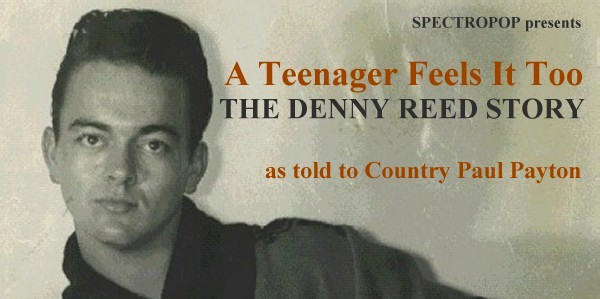
 |
 |
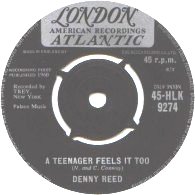 |
|
[click on each image for larger view] | ||
In my S'pop review of the CD 'Teenage Crush, Vol. 4', I commented on the innocence and sweetness of many of the included tracks and wrote that "one listen to 'A TEENAGER FEELS IT TOO' by DENNY REED will send you to the dentist with an instant cavity!" I also noted the song was one of a group of "quality records that have been under-exposed on reissues and on the radio." Imagine my surprise to hear from Denny Reed himself!
I wanted to thank you for your review. Yes, I am the "sugar singer" that you wrote of giving an instant cavity on the song 'A Teenager Feels It Too'. Well, you were correct. Having said that, I wondered if you ever analyzed why or where the "sugar" came from or how it evolved. At 16 years old I was a huge fan of Johnny Mathis and, believe it or not, Bing Crosby. My friends at the time thought I was nuts. However, I wanted to build a big range. So I practiced hours and hours every day with Johnny Mathis and Bing Crosby. I eventually was able to sing higher than Mathis and lower than Crosby, and developed a 4-octave range. Now, when I recorded 'A Teenager Feels It Too', I had only sung with a band twice before in my life. I had not developed my range but I was learning to sing from Mathis and Crosby, both "crooners". I was a teenage crooner. Hence the sugar. Plus, I was 16 or 17 years old and was pretty innocent, totally unsophisticated and downright sheltered from the ways of the world.
Denny's "teenage crooning" got him to #94 in 1960 when his
second single, originally on Phoenix-based MCI, was reissued on Trey.
Trey was Lester Sill and Lee Hazlewood's label, distributed by Atlantic
Records. I feel sure that had 'A Teenager Feels It Too' been on RCA, or
let's say a "white" (for lack of a better word) label like Chancellor,
or another strong independent of the day, it would have been a Top 10
record. When I went on tour I had a lot of black promotion men who were
handling product from Atco and Atlantic, and this bubblegum type of material
that I had was not in the their contact base, which was R & B. So
lack of good distribution and promotion really hurt the potential sales.
I came into Detroit and met with this black promo man, and he said, "You
got a cool record man, but it ain't really happenin' with my stations."
The MCI label was also the starting point for Sanford Clark's huge hit, 'The Fool'. It's sister label, Ramco, was home to later Clark records, as well as some early tracks by Waylon Jennings.
RAMSEY'S
I recorded 'Teenager' in Phoenix, Arizona at Ramsey's Audio Recorders. It was a tiny little studio, and the echo chamber was a 1000-gallon propane tank. They put a microphone inside and wired it into the control booth. Duane Eddy was also with Sill and Hazlewood. Now here is something I bet you didn't know: on every Duane Eddy hit, there were sparrows singing on the track. That's right, the birds would gather on top of the tank and sing away. When the engineer, Jack Miller, turned down the volume levels on the instruments but left the echo chamber open, you could hear the "boids" tweeting away. Of course, with the music up it was totally buried. If you want to verify this, call Jack Miller Productions in Phoenix and confirm.
LESTER SILL
When I went on tour with 'A Teenager Feels It Too', I was about 17 or 18 years old. I was by myself and ran into numerous problems. I was flying to San Francisco to do a TV show. As we were approaching the field to land, the captain announced that we were having some technical problems. It turned out that the landing gears were down but the red light indictor was showing that the gears would not lock. In other words, when we touched down the plane's wheels might collapse. We circled the field for an hour or so burning up fuel. I happened to be sitting next to the emergency door. The stewardess asked me if I would want to change seats with a more mature person sitting next to me. I said, "Not on your life!" As we were finally coming in, I could see several fire engines on the landing strip. They made everyone bend over and put our faces in pillows. I really thought, "I am going to die and I only have two songs in the can!" Well, the wheels did not collapse and we made it. But I was flying almost every day, and I must tell you that episode did affect me somewhat. Because we circled the field burning up fuel, etc., I was behind schedule. I called Lester Sill, and he said, "Den, where the hell are you"? I said, "Les, my plane was in danger of crashing, and they made us bend over and put pillows under our faces, and I'm a wreck!" He said in his fatherly way, "OK, forget about it, Den, now you still have time to make the TV show", and he talked me back to normal. Really, Lester kept a good watch and care over me. I miss him very much.
PHIL SPECTOR
Phil Spector used to work around with Sill and Hazlewood. Jazz drummer
Pete Magadini was partially responsible for getting me my first record
contract. He's also from Phoenix. Pete is a great drummer who has excelled
as a musician playing with the top jazz players in the world. He was Diana
Ross's drummer when she opened in Las Vegas. He has multiple books on
teaching polyrhythms, and is my oldest friend in the music business. One
day Lester Sill and Lee Hazlewood came in to record from LA. They had
the unique Phil Spector producing this session. Pete and I came in and
I helped him unload his drums and set up for the session. I was really
excited to meet Phil Spector. Well, the session gets underway and Phil
goes out to talk to the band. He puts his foot up on the rim of Pete's
bass drum to support his guitar. Pete says, "Hey man, use a chair,
not my new drum." The whole place got instantly silent for what seemed
to be an eternity. The day ended and as Pete and I were riding home, I
said, "Well, that was weird." Pete, says "Man, I wouldn't
let my mother step on my drums. If the guy doesn't respect me more than
that, let him find another drummer!" Pete Magadini should have his
picture under the word "cool" in the dictionary. He was born
cool!
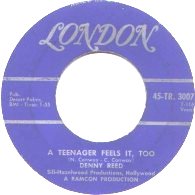 |
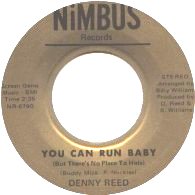 |
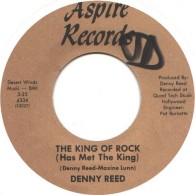 |
|
[click on each image for larger view] | ||
Denny's very pretty follow-up, 'No One Cares', was composed, arranged and conducted by Connie Conway. I had often wondered who he was, as I have a beautiful single by him released on Jamie called 'Nothing Is Forever'. I asked Denny if Connie Conway was part of the Phoenix scene, too.
CONNIE CONWAY
Well, it wouldn't be a complete day without another story. Connie Conway [also] wrote 'A Teenager Feels It Too" for me. He was my manager and producer. He was an excellent singer and musician. I used to have a very rare album of his, and he sounds so much like Sinatra!! Connie also played brushes on a snare drum on 'Teenager' along with Donnie Owens on rhythm guitar, Don Cole on electric guitar and Jimmy Wilcox on upright bass. Connie's two 13- and 14-year-old daughters sang background. Earlier on, Connie used to play in a group in Phoenix which had a piano player and singer who decided to go to Hollywood and try out his dreams. The dreams came true; that piano player was Steve Allen!
DICK CLARK
I had two shots on the old American Bandstand show with Dick Clark. Lester Sill was very tight with Dick, probably through Duane Eddy's huge success. The old Bandstand shows were shot in kinescope and unfortunately were destroyed. Several years passed after my appearances in 1960 With 'A Teenager Feels It Too'. I was living in Hollywood working at making records and writing. I went into an Arby's Roast Beef Restaurant and was standing in line, and in walks Dick Clark. He immediately recognized me and came over to say hello. We proceeded to sit down and have lunch together. Towards the end of our lunch he said to me, "Denny, it is mathematically impossible to have a hit record." I said, "What do you mean, mathematically impossible?" He said, "Well, first of all, you have the top 40 that has to be played. Then you have anywhere from 400 to 500 records that come out per week counting all of the independents (which in those days were many). It takes about three to four weeks of concentrated airplay to "break" a record into the top 40. Multiply four weeks to break a record times 400 to 500 records being released each week and that's upwards of 2000 records released per month, most which will not even be heard much less played. So you see it is mathematically impossible to have a hit record." He got up from the table, and looked me square in the eye, and said, "But you gotta keep trying anyway." He smiled and left the restaurant.
JIM LEE
I was signed to United Artists by Eddie Matthews and Aaron Schroeder, who managed myself and Gene Pitney. Meeting Aaron Schroeder is a very interesting story. While on Trey, I met a guy named Jim Lee, who was a promotion man for independent record labels. He was working for Lester Sill and promoting my record on Trey but the masters were owned by MCI. He also was part-owner of Indigo Records. The label had hits with Kathy Young and the Innocents. Jim eventually wrote 'Let's Dance' for Chris Montez. MCI inadvertently let my contract expire. I decided not to re-sign with them for a variety of reasons, one being they waited months after my debut record hit the national charts in Cash Box and Billboard before they recorded and released a follow-up, thus losing momentum and continued recognition. I thought it was a costly mistake. I was traveling around with Kathy Young and the Innocents doing shows all over California, and Jim Lee wanted to produce me and sign me with Indigo. So Indigo Records gave me a job in their office for some pocket money.
AARON SCHROEDER
While I was there Aaron Schroeder came into the office pitching songs
to the label. He said to me, "If you ever get to New York, look me
up." I was so naïve, I didn't understand that he probably said
that to his taxi driver. However, I took him seriously. One day, Jim Lee
was dropping me off at this fleabag hotel where I was staying, and I said
to him, "Jim, I am not going to sign with Indigo Records." He
asked me why, and I told him, "I see orders for thousands of records
to be shipped and the orders are not being filled in a timely manner.
I think it is hurting the sales for Indigo and I don't see how the label
will continue to be successful in the long haul."
So I left Hollywood and moved back to Illinois. My plan was to record
some demos and go to New York and find Aaron Schroeder. I got back to
Illinois and got a job in a copper metal plant where I worked for several
months, and was eventually fired after getting in a fight and throwing
a roll of copper at this smart-ass and knocking him over a machine. I
then went over to St. Louis, Missouri, and found a 4-piece group, recorded
the demos.
NEW YORK, NEW YORK
I got a ride to New York with a guy who lived in Fair Lawn, New Jersey.
When we got to New Jersey, his family asked me to stay a few days through
the weekend, so I did. Monday morning they left this 18-year-old kid out
on the streets of New York. Within two minutes a guy tried to steal my
suitcase! I felt like I had a sign on my back: "fresh meat in town."
I found a horrible but affordable hotel, a place with dark halls and a
dim 25-watt bulb with a shoestring attached for the guests to pull off
and on for a little light. As I came up to my room, a drunk or passed-out
person was laying in the hall. I got into the room and started unpacking
my suitcase and noticed bed bugs crawling on the bed, so from that point
on I slept in a couple of chairs pushed together.
The next day I headed for the Brill Building and a meeting with Aaron
Schroeder. He wouldn't see me. I tried again every day for about two weeks.
I was using up the small amount of money I had, even though I was eating
only one piece of bread with peanut butter for my entire meal for the
day. I went down to the automat and would pour a water glass full of ketchup
and add hot water and drank ketchup soup.
I finally gave up on Aaron Schroeder and went to Columbia Records. In front of me was a very well dressed man who was trying to get in and see someone, and the secretary just chewed him up and spit him out, and he of course did not get past her. I was next. I was dressed casual but clean. I told her I needed to see the head A & R man and she said, "You will need an appointment to see him." I said, "OK, so make me an appointment." She told me she couldn't do that and sent me on my way. I went down the hall, found a pay phone and called the same lady back on the phone. I said, "This is Denny Reed, if Joe wants to see me, it will have to be today. I am leaving in the morning for a tour in Europe and won't be back for 4 months." She gave me an appointment. At two o'clock I arrived to see Joe and she said to me, "I told you this morning that you have to have an appointment!" I said, "Denny Reed, two o'clock." So I got in to see the A& R man. My demo had five tracks on it and he listened to every track all the way through and right on the spot offered me a contract. He said to come back the next day and he would have the contract ready.
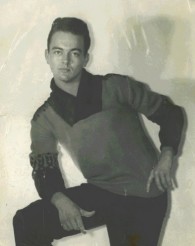 |
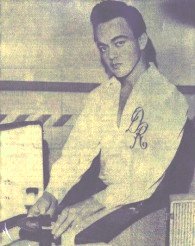 |
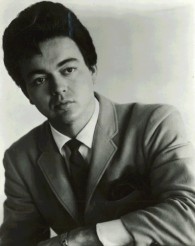 |
|
[click on each image for larger view] |
||
FLAT BROKE
Now, I was very happy but also very close to being flat broke. I had
less than 50 cents in my pocket. I went over to Aaron Schroeder's at the
Brill Building. I am not sure why, but I think I wanted to tell him off
or yell at him or maybe brag that Columbia had offered me a contract.
When I arrived, to my surprise they took me back to see him. He apologized
for not seeing me earlier. He listened to my demo and picked up the phone
and called Eddie Matthews over at United Artists. I went over there, and
met with Eddie. He listened to my dub and paced the floor without saying
a word. Finally, he looked at me and said, "You're going to be a
big star." I thought, "Oh no! He's gay!" He offered me
3%, which was pretty standard in those days. I told him I wanted 5%. He
said, "We don't give 5%. Elvis only gets 7%. What makes you think
you can demand 5%?" Through tired and weary eyes (from no food and
no sleep), I looked at him and said, "I am not demanding 5%, my talent
is demanding 5%!" I received the 5%.
As I was leaving, I said, "I don't have any money," and he gave
me a hundred dollars. I moved into a nice hotel and went back down to
the automat and ordered a big drumstick, macaroni and cheese, mashed potatoes.
My plate was overflowing. I took a bite out of the drumstick, and thought,
"I am with United Artists and Aaron Schroeder is my manager!"
I took one more bite and had to leave all of the food because I hadn't
eaten in so long that I just got sick.
Within a few days we recorded at Bell Sound Studios, using some of the
best [musicians] in New York. Teddy Randazzo and his singing group did
the vocal background and Al Caiola played guitar. I nailed it on the second
take with no overdubs. I left for home and the record of 'I'm Comin' Home'
was released within two weeks. Charlie Rich wrote the song, I wrote the
narration. It was taken from the 'Elvis Is Back' album. We got picks in
every trade paper, but only spotty airplay. Poor promotion. The record
seems to have done much better in Europe.
THE $10,000 ACETATE
Several years after I had recorded 'I'm Comin' Home' for United Artists,
I received a letter from BMI stating that someone wanted my address to
send me some materials. I contacted the person in Lacrosse, Wisconsin,
a gentleman that was representing a party that had purchased an acetate
or dub with a Bell Sound studios label, which is where I had recorded
the song in New York. He said that his client had thought he had purchased
an original Elvis recording. He even had a voice print analysis performed
by the Wisconsin State police to make sure it was Elvis, and according
to the voice prints it was a match to the probability of being Elvis.
He said his client, being a huge Elvis fan, bought it for $10,000 in a
sleeve made of a velvet material and enclosed in a beautiful hardwood
box. Some marketing, huh? The guy that contacted me through BMI asked
me if I could prove that it was me who was actually singing and not Elvis.
I said, "I don't have to prove it, cause I was there!" He pleaded
with me, and I was able to document from a newspaper article when and
where and how I had recorded the single. He told me that National Enquirer
or one of the rag newspapers was offering to do stories, and that the
guy was going to make a lot of money from his investment. I told him,
"If you guys can make a buck on it, that's your call. I am stating
100% that I, Denny Reed, am the artist on that acetate, and it is not
Elvis. So do whatever you feel is right." I never heard back again,
but I still have his letter somewhere if you need verification.
Denny Reed is presently based in the midwest, and has been far more
actively involved in music than his discography might indicate.
At various times I was offered contracts from RCA, Warner Bros (three
different times), Colpix, Lou Adler, A& M from Herb Alpert himself,
Russ Reagan at Uni Records, and Decca. About 85 to 90% of the recordings
I have made were never released or heard. I have many stories, some funny,
some sad. Example: the night I danced down a flight of steps and ended
up shaking Paul Anka's hand and tried to sell him some real estate (actually,
I fell down a flight of steps and was able to keep my balance); or Kim
Fowley and myself stealing food out of refrigerators in Hollywood to keep
from starving; or the night I smashed Clint Eastwood's shopping cart with
my shopping cart in Carmel, California, and literally thought he was going
to "make my day"; or Fabian rescuing me from an unwilling Jaguar
automobile in Hollywood; or Jan & Dean and myself doing a TV show
in Washington DC in which nobody clapped at the end of our performance;
or Joanie Sommers and myself getting booed on a TV appearance at POP park
with Wink Martindale.
I have worked with some of the greats in our business including Mike
Post, Gary Paxton, Don Randi, Michael Rubini, Matt Rollings, Pete Magadini,
Chuck Kaye (Dreamworks Music), Steve Stone (CEO of Sony Music), Cliffie
Stone, John Hobbs, Teddy Randazzo, Billy Williams, Al Casey, Duane Eddy,
Al Caiola, Lester Sill, Lee Hazlewood, Buddy Killen, Pig Robbins, James
Burton, Glenn D. Hardin, Aaron Schroeder, Mike Curb, Joe Osborn, Jimmy
Bowen, Glen Campbell, David Gates, Al Capps and many others. I have written
and sung on radio commercials, but it was never enough to keep me afloat
on an ongoing regular basis. I sang demos for publishers on the west coast,
in which my job was to get the feel and sound of whoever they were pitching
the song to. In that regard, I have sung demos for Johnny Mathis, Andy
Williams, Elvis, Roy Orbison, Marty Robbins, Gordon Lightfoot, B. J. Thomas
and others. I am living in Illinois currently, about 25 minutes out of
St. Louis, Missouri, and about four or five hours drive to Nashville,
Tennessee. I am still very actively recording and releasing product. I
also work as a voice-over artist, both spoken and as a singer, for commercials
and animated films.
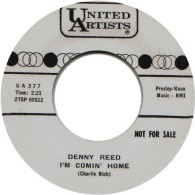 |
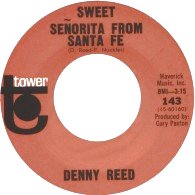 |
 |
|
[click on each image for larger view] | ||
|
DENNY REED DISCOGRAPHY |
||
|
|
||
|
A Teenager Feels It Too / Hot Water |
MCI 1024 |
|
|
A Teenager Feels It Too / Hot Water |
Trey 3007 |
1960 |
|
No One Cares / Lonely Little Bluebird |
Trey 3014 |
1961 |
|
I'm Comin' Home / Keep Me In Mind |
United Artists 377 |
1961 |
|
Faithful To The End / Lamp of Love |
Dot 16400 |
1962 |
|
In This Town Of Heartbreak / |
Tower 143 |
1965 |
|
Tossin' And Turnin' / |
Nimbus 6790 |
|
|
The King Of Rock (Has Met The King) / Ridin' On Empty |
Aspire 334 |
|
|
Tenacity LP (10 tracks) |
Dionysus DR333 |
1976 |
|
THE PUDDIN' HEADS |
||
|
You Don't Have To Be Lonely / |
Catch 111 |
1964 |
|
THE BONDSMEN |
||
|
You Can Run Baby (unauthorized release) |
Barron 1001-A |
|
|
DENNY REED also appears on four or five compilation CDs released in 2003 and 2004 on three different labels. |
||
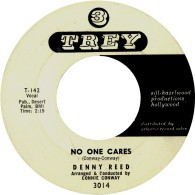 |
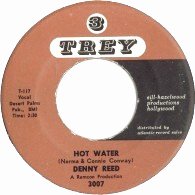 |
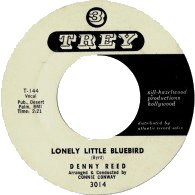 |
|
[click on each image for larger view] | ||
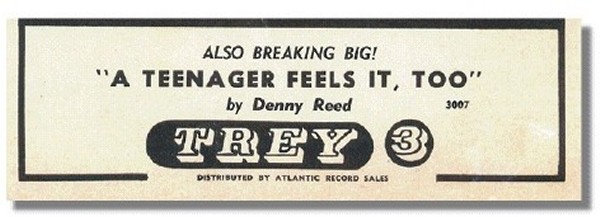
Label scans supplied by John Dixon and David A. Young.
Contact Denny Reed at LITTLESTARR@peoplepc.com
Presented by the Spectropop Team